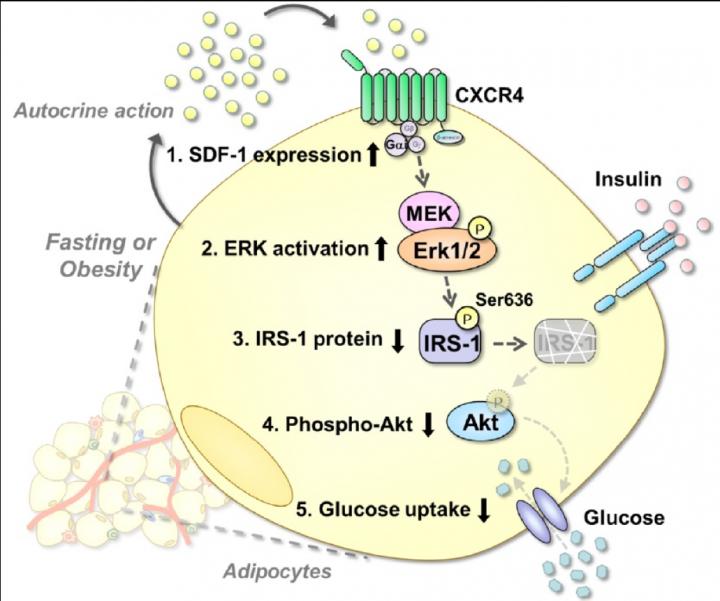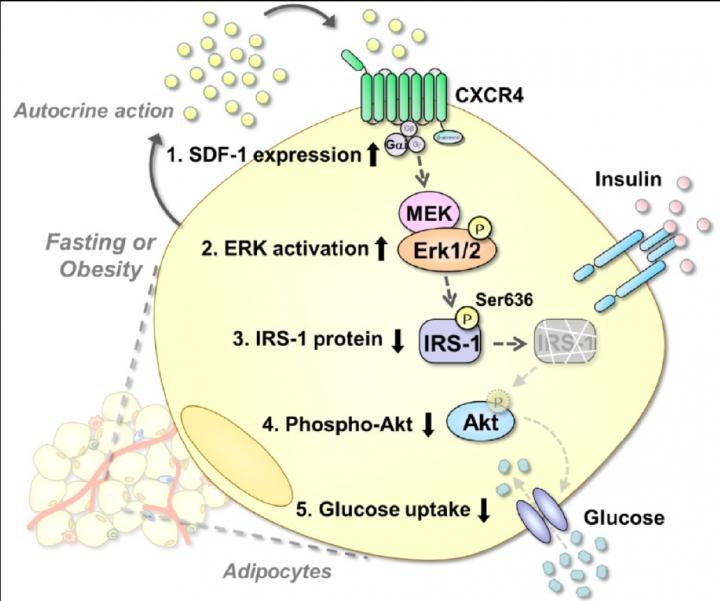
Credit: Osaka University
Scientists at Osaka University discovered that Stromal derived factor-1 (SDF-1) secreted from adipocytes reduced the effectiveness of insulin in adipocytes and decreased insulin-induced glucose uptake.
Insulin is a hormone made by the pancreas and helps cells to take in glucose from the blood. Insulin binds to insulin receptors to activate Insulin Receptor Substrate 1 (IRS-1), taking in sugar through phosphorylation of Akt. If insulin loses its effectiveness, a bulk of the cells in the body becomes unable to take up glucose and high blood sugar levels persist, leading to diabetes.
A group of researchers led by Atsunori Fukuhara has reported that adipocytokine, or cell signaling proteins secreted by the adipose tissue, played a role in developing obesity. However, it was not known that adipocytokine activated on adipocytes themselves to control insulin sensitivity. SDF-1, one of the adipocytokines, is the most predominantly expressed chemokine; however, its action on glucose uptake in cells had not been analyzed.
Using microarray database analysis, this group of scientists identified SDF-1 as a factor to enhance expression in adipocytes in both fasting and obese states and found that SDF-1 reduced the effectiveness of insulin in adipocytes. In actuality, in SDF-1 knockout mice, insulin-induced glucose uptake increased (i.e., blood sugar levels decreased), and insulin efficacy improved (i.e., insulin sensitivity was enhanced). Their research results were published in Diabetes.
Based on the results of this study, it is expected that insulin sensitivity in adipocytes will increase by inactivating the SDF-1 signaling pathway, which will lead to treatment of obese type 2 diabetes.
###
Osaka University was founded in 1931 as one of the seven imperial universities of Japan and now has expanded to one of Japan's leading comprehensive universities. The University has now embarked on open research revolution from a position as Japan's most innovative university and among the most innovative institutions in the world according to Reuters 2015 Top 100 Innovative Universities and the Nature Index Innovation 2017. The university's ability to innovate from the stage of fundamental research through the creation of useful technology with economic impact stems from its broad disciplinary spectrum.
Website: http://resou.osaka-u.ac.jp/en/top
Media Contact
Saori Obayashi
[email protected]
81-661-055-886
@osaka_univ_e
http://www.osaka-u.ac.jp/en
Original Source
http://resou.osaka-u.ac.jp/en/research/2018/20180409_1 http://dx.doi.org/10.2337/db17-0706





